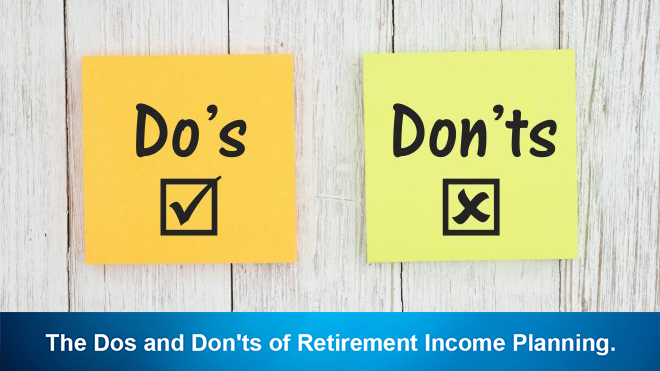Retirement presents a unique set of challenges that many of us never think about, even as we plan for it. This can be a daunting undertaking. Let’s look at some key points that can get you on the right track to planning a successful retirement.
Planning for retirement is like running a marathon. Set a steady pace and keep going. And even if you are not at the doorstep of retirement, there are some critical dos and don’ts related to retirement planning that anyone could benefit from.
While it’s helpful to know what to do to plan for retirement, it might be just as important to know what to avoid, because there are plenty of missteps you can make. Here are four things you should and four things you should not do as you look ahead to retirement.



When you embark on your retirement planning, you will probably have lots of ideas to what your golden years will look like. It’s intimidating to realize that you might need to save $1 million or more in order to fund a comfortable retirement. A large retirement savings goal can feel unreachable and reduce your motivation to save each month.
Therefore, start with a monthly/yearly amount to set aside, then aim to increase it each year or every time you get a raise. Consistently saving a small amount of money can be enough to accumulate an impressive nest egg if you give it enough time to grow. Many 401(k) plans are set up so that you select a percentage of your salary to contribute to the account. Saving a proportion of your income means you will automatically save a larger dollar amount as your paychecks grow.
So make a plan, make it realistic, and most importantly; stick to it.

While stepping into retirement might mean walking away from a job, many Americans are dragging financial baggage into this next stage: debt.
There’s not much point of saving for retirement if you are accumulating debt in other places. Just making the decision to get out of debt can subconsciously help you reduce spending, which may ultimately lead to increased savings. Psychologically, many people are more comfortable in retirement when they are not responsible for making debt payments.
So set new financial priorities and take steps to eliminate your existing debt first. Check out our blog, ‘Retiring With Debt? Here’s What You Need to Know’ for strategies to help you on your way to a debt-free retirement here.

Anyone who has access to a 401(k) might want to take advantage of the free match. While every company’s matching program is different, most offer a dollar-for-dollar match up to a certain percentage of your pay.
If you are behind on your contributions or getting a late start on saving, here’s some good news: you can make catch-up contributions.
The IRS updated the contribution limits for 401(k) plans in 2020 on Nov. 6, 2019, increasing the employee contribution from $19,000 to $19,500. On Oct. 26, 2020, the IRS made updates for 2021. The employee contribution remained at $19,500. The catch-up contribution remains the same at $6,500.
One change that did occur was the limit on combined employer/employee contributions. This amount rose to $58,000 and when you add a catch-up contribution, the limit goes up to $64,500.

Life is full of surprises, and everything can change in an instant.
While you can’t foresee what life has in store for you, you can prepare for the unexpected and put yourself in a better position to handle unplanned expenses. Unexpected expenses, especially medical and long-term care needs, can devastate your financial situation in retirement.
Cash reserves have never been more essential to protecting your finances. Your emergency fund should aim to cover three to six months of expenses—perhaps as much as a year if your job isn’t secure. That money should be kept in a safe, easily accessible account, which will spare you from having to tap retirement funds or run up your credit card balance for unexpected bills.



For many, retirement may seem far off, but time has a way of sneaking up on us. Rather than waiting until retirement is just a few years off, it is important to start thinking about retirement now.
Whether you are in your 20’s and 30’s and just starting off with your career or in your 40’s and 50’s and getting closer to retirement, having a plan in place can make all the difference for a successful retirement.

Social Security provides a foundation of income on which workers can build to plan for their retirement. It also provides valuable social insurance protection to workers who become disabled and to families whose breadwinner dies.
However, if you’re relying too much on benefits, it could potentially put your retirement at risk. Currently, the Social Security Administration (SSA) is leaning on its two trust funds to continue paying out benefits in full. But once those trust funds run dry in 2034 (or even sooner, thanks to COVID-19), benefits could be reduced by nearly 25%. For those who depend on their benefits to make ends meet, these cuts could spell disaster.
With Social Security on shaky ground, it’s more important than ever to make sure you have a robust retirement fund so you can enjoy your senior years comfortably.

As we live longer, our health care costs will take up more of our retirement savings. While we often save for medical expenses, sometimes we overlook long-term care costs. According to a recent analysis by Fidelity Investments, a couple retiring at age 65 this year could end up paying $280,000 on medical care in retirement. While this estimate is over a roughly two decade period, it does not include prices for dental care, long-term care, and over-the-counter drugs.
It’s expected that healthcare costs will continue to rise in the future, which is why it’s important that your retirement plan accounts for these upcoming expenses.

There are plenty of times when people can handle retirement planning themselves (being in your 20s and contributing to your 401(k) for example). In other instances, the do-it-yourself approach could be a mistake.
Because retirement planners are trained to deal with myriad personal financial topics, they can help you set financial goals and priorities, then recommend specific steps to meet them. This means they may give advice on how you should allocate your investments, what kind of insurance you really need and explain how certain moves may affect your taxes or estate.

Financial security in retirement doesn’t just happen. It takes planning and commitment. While these dos and don’ts are meant to point you in the right direction, you’ll need more detailed information as every retirement plan should be tailored to your unique circumstances.
At CKS Summit Group, our team of experts can help you create a well-thought-out, custom retirement strategy, using a variety of cutting edge tactical portfolios to help you achieve safe, healthy growth of your savings and face the future with anticipation instead of apprehension.
Contact us here today for a complimentary retirement strategy session.



